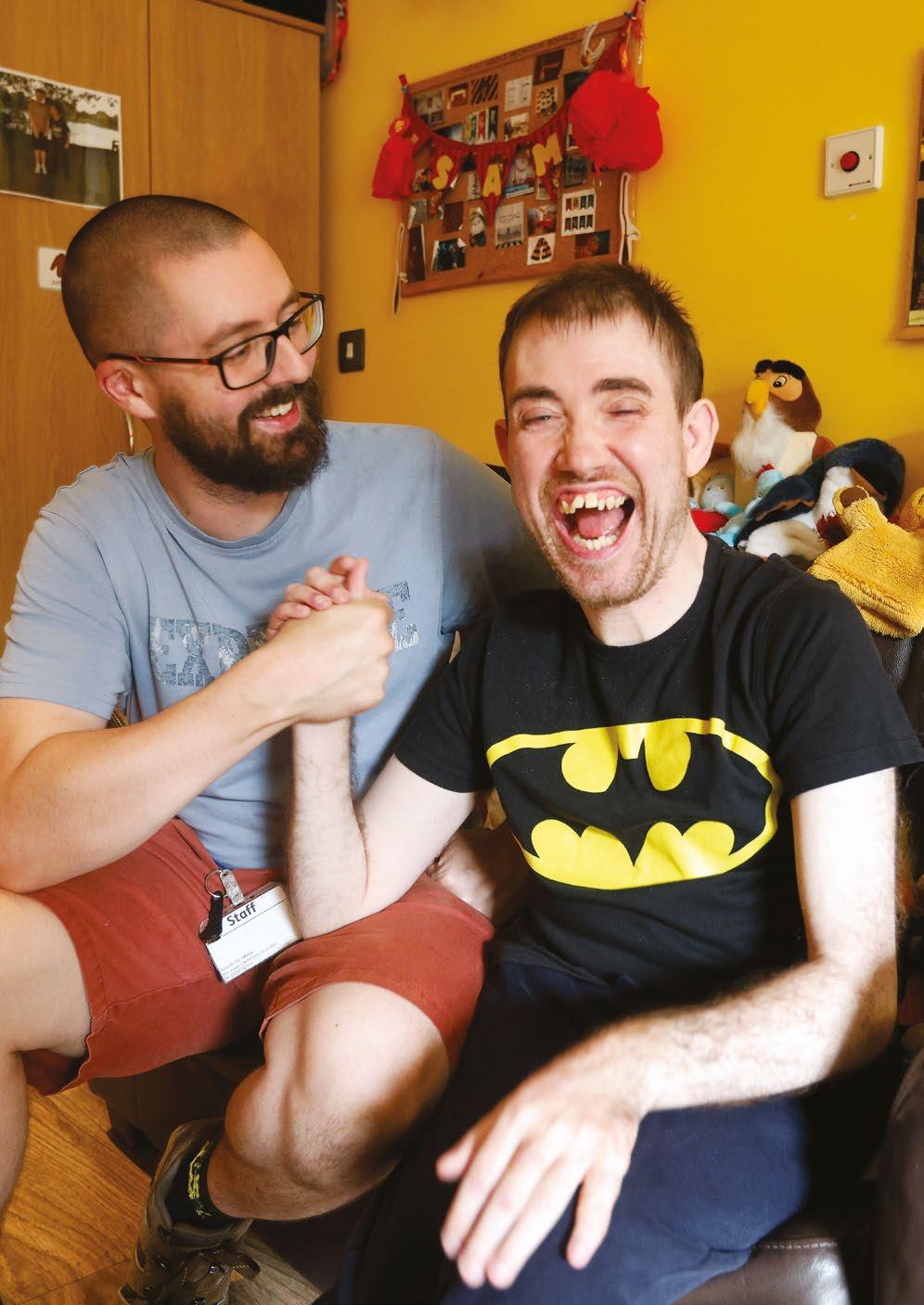


Support your young person for life after college






Support your young person for life after college


Transition is a term used to describe what happens when people move between places or services.
It can be a difficult time for all young people with complex disabilities. This guide is designed to make that process easier and as stress–free as possible.
It is understandable that many families and young people may not see planning for life after college as a priority when they first join National Star.
However, in our experience young people who work towards this from an early stage are better prepared emotionally and physically for the next stage of their life journey.
By working together, we can ensure that young people achieve their long–term goals for adulthood.

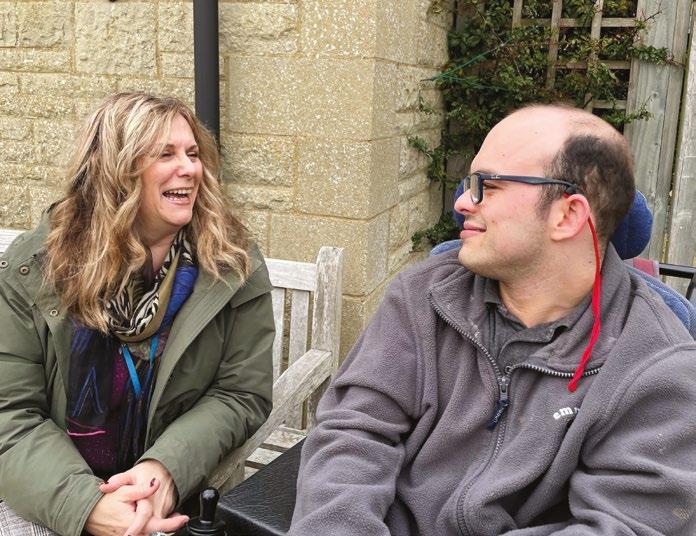
Former National Star student Theo says he is ‘living his best life’ after moving into supported living accommodation in Gloucestershire after leaving college.
Theo is living with another former National Star student. He says they are like a brother and sister. He is getting to know his new support workers and is becoming more confident in directing his own care.
Originally from London, Theo was keen to remain in Gloucestershire because he had so many friends in the county. He continues to volunteer in the Emmaus charity shop in Gloucester and is also an active member of the Crusaders Boccia Club in Cheltenham. He also enjoys attending community learning classes at National Star, so regularly bumps into his old college friends.
‘Living in supported accommodation is more relaxed than at college and I have more freedom. I’m living my best life and am enjoying making decisions for myself,’ said Theo.
‘I have my own transport and so go out a lot. I’m trying to make more friends too,’ he added.
Theo is clear that the reason things have worked out well for him is because he worked with his family to start planning his transition early and he had a lot of support from the Transition Support Team.
With National Star...
Former student Theo “ “
I’m living my best life and am enjoying making decisions for myself.
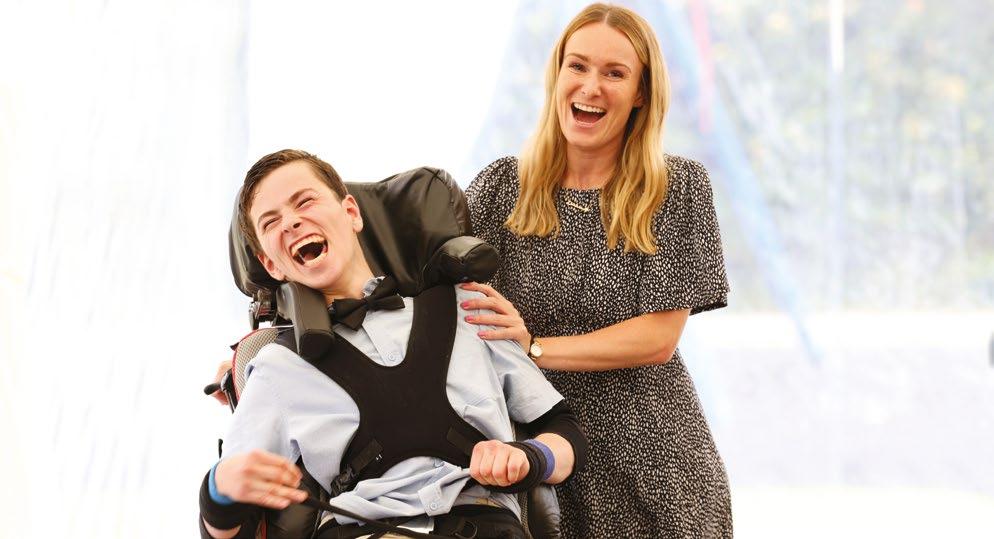
Your young person’s PLC or PLCT will support them to prepare for life after college and they are your first point of contact regarding transition.
They teach life skills and explore a student’s goals and hopes for the future in dedicated one–to–one ‘Planning for My Future’ sessions.
Whatever skills or aspirations your young person has, our team of Job Coaches will support students to build their confidence for the world of work if that is the right choice for them. Working with a range of employers, each Job Coach will assist students to gain skills for their new job, whether this be CV–writing, experience in their chosen career or helping them find a role or volunteer placement in their home county, or possibly elsewhere if moving out of the area.
The Transition Support team ensures everyone keeps up–to–date with policy and legislation matters. They also deliver training / workshops for staff, students and families. They also use their expertise to complete bespoke ‘life after college’ research.
The team also liaises with LA Commissioning Teams, CHC / ICB Case Management Teams and works in partnership with a network of housing and care providers to support funding applications and identify appropriate services to meet complex care needs.
The Transition Support Team:
• Advocates for all students
• Contributes to student transition plans
• Provides bespoke information and guidance for students, families / carers and staff
• Builds partnerships with internal and external organisations to benefit students
• Manages the Life After College information system to support the team around your young person
• Runs an interactive and valuable annual transition event
As someone with your young person’s best interests at heart, you are likely to have talked to them about their post–college plans.
We’d encourage you to keep this dialogue going during their time with us. Don’t be surprised if their goals and aspirations change over time. We agree initial post–college plans at the baseline review in the first term. Goals are then set to help achieve these future aspirations. Each year we will review every young person’s post–college goals with them.
• Be proactive in understanding future options
• Attend National Star Family / Carer forums to keep up–to–date with transition information
• Build connections with other local families
• Join the National Star private ‘Life After College’ Parent and Carers Network Group on Facebook. This is a safe space to share information with other families and carers.
• Support your young person to make the most of the annual National Star ’Life After College’ Transition event – a not–to–be–missed opportunity. You and your young person can meet local and national housing, care and support and activity providers. Seminars, exploring different aspects of the transition process, form part of the day. You can also receive transition information from the families of current and former students. National Star alumni also share their experience of life after college. There is also an opportunity to network with the families / carers of other leavers and explore opportunities.
• To help navigate and understand your young person’s wishes
• To develop support plans
• To understand the rights of the young person
• To provide guidance and signposting to providers and services
• To help you to understand the social care and assessment process
Planning for life after college takes time and input from National Star professionals, families and students. Familiarise yourself with the timelines on page 16 and 17 to help your young person prepare for life after education.
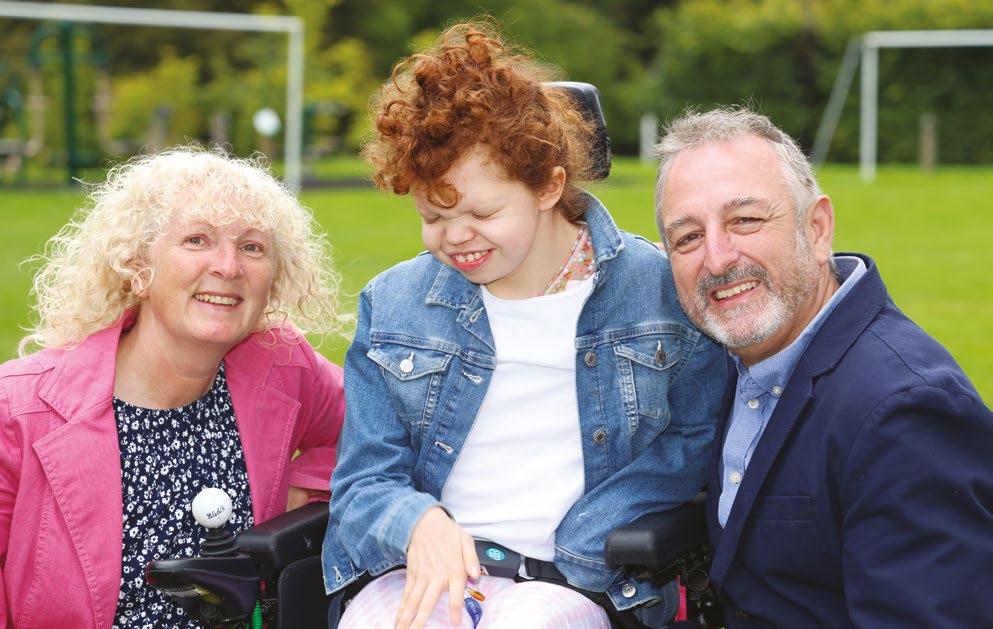
In our experience, young people who start planning and working towards their long–term goals for after college from their arrival at National Star, are better prepared emotionally and physically for the next stage of their life journey. To support this, we have therefore included some essential and desirable top tips:
1
Essential
• Start planning early! Talk to your young person and their PLC / PLCT about transition.
• Make a list of your young person’s needs and aspirations.
Desirable
• Highlight what is essential and what is desirable.
• Have a Plan A and a Plan B agreed by the first term of the final year at National Star.
2
Essential
• Engage with your local authority at an early stage to understand their process.
• Ensure you have a Social Worker or healthcare lead in place for the final year of college.
Desirable
• Visit the website for your Local Authority and review the Local Offer.
3
Essential
• Don’t assume the Local Authority will be as proactive as you’d like them to be.
Desirable
• Do your own research, join local carer forums, visit services and providers and attend local transition events in your area.
• Read CQC reports for the services you are interested in and if possible, visit a short list of three or four select services to identify a preferred provider and ideally, a service that might meet your young person’s needs.


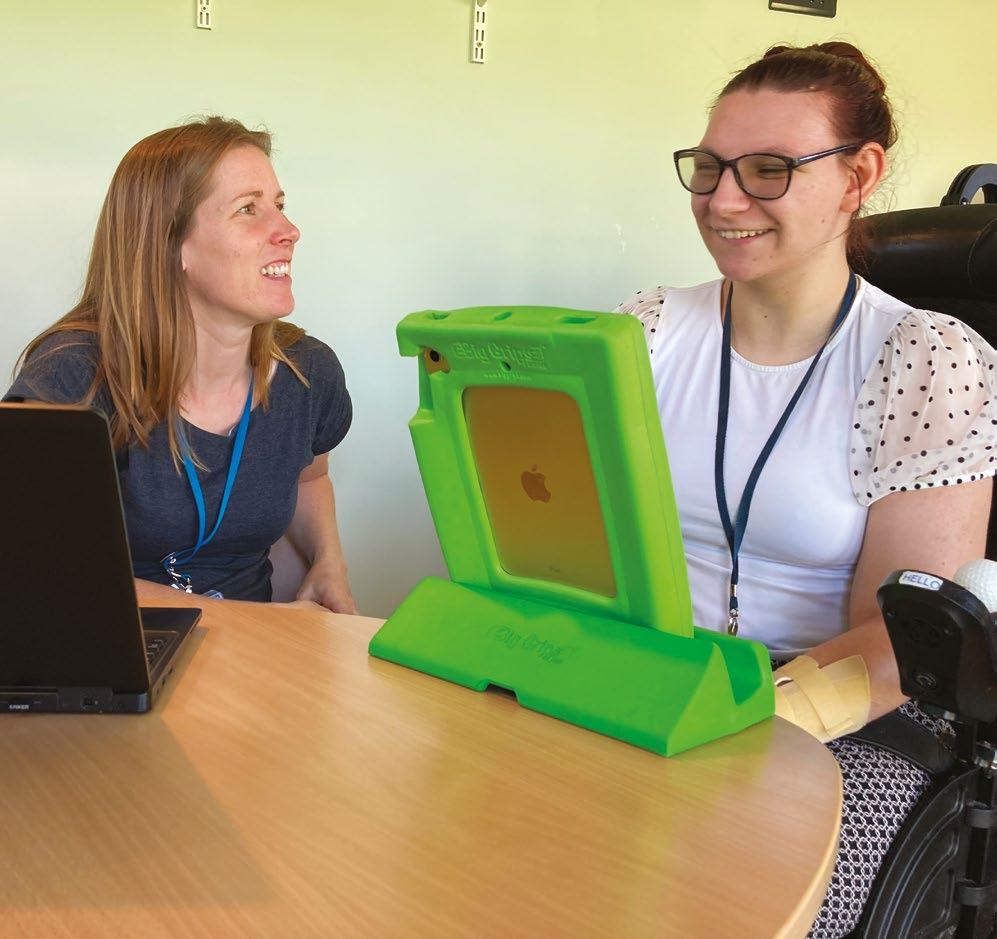
“
Without National Star... “
Rachel would not have been able to move away from home and have the independent life she dreamed of. Rachel’s mum Kelly
National Star has enabled Rachel to fulfil her ambition of moving away from home and her parents into her own place. Rachel, who uses a powerchair, has severe vision impairment and cerebral palsy. She depended on others for everything from being supported to get up in the morning to checking her emails and turning on her TV.
That lack of control had a huge impact on her behaviour and Rachel would be upset for days.
The team worked with Rachel to find the latest technology and equipment to enable her to be more in charge of her own life. She can answer and send emails independently by using Speaking Emails.
Thanks to smart technology, Rachel can control her TV, listen to music when she chooses and control the lighting in her room, from changing the colours and intensity of the light to opening the curtains. She also uses an AI (artificial intelligence) app which describes food products, reads printed material and can even give a description of a person.
‘Rachel is now so grown up and so determined to be independent,’ said mum Kelly. ‘She’s an absolute star.’
There are different types of support. This is most of them, but your local authority may have a slightly different approach depending on where you live.
Sometimes known as domiciliary care, outreach, or floating support. It is for people who live independently in their own home or with friends or family who may need some support with some daily life skills such as finance, cooking or shopping.
Short breaks – also known as respite, are designed to give the young person and their family / carers a break. Short breaks are a good way to make friends and to try out new things and if appropriate, prepare for living more independently in the future.
Provides accommodation, care and support, meals and household expenses with an inclusive fee. Residential homes are staffed 24 hours a day and are often the preferred option for people with complex health needs.
This is support to help people with disabilities to find work. There may be an eligibility criterion for some of the support. Some areas have council run schemes.
This can be an individual or shared household. Each person will have their own tenancy agreement. Some people may need 24–hour support which can be provided whilst others may only need a few hours of support a day. People with complex needs can also be supported in this type of service.
In Shared Lives, an adult or young person who needs long–term support is matched with a carefully approved Shared Lives carer. The Shared Lives scheme is run or commissioned by adult social care services at each local council and the Shared Lives carer shares their family and community life, whilst giving care and support to the person with care needs.


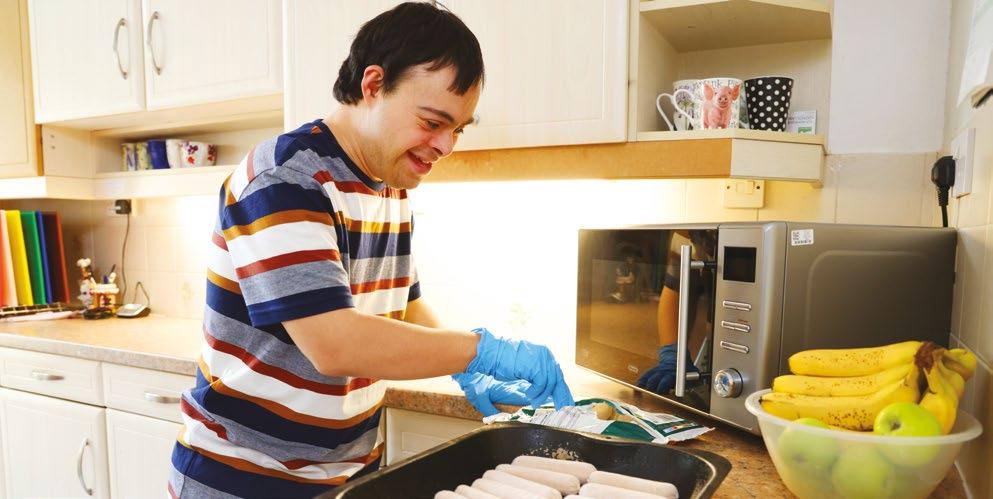
Arrangements can vary across the country so use the following information as the starting point for how to work with local authorities. There are different types of support. We have outlined the most common. Your local authority may have a different approach depending on where you live.
Support for people with physical and learning disabilities is often described as support, care or service provision.
Support providers can operate as a charity or as a for–profit or not–for–profit company. They vary in size and can deliver services locally or nationally.
The Care Quality Commission (CQC) website (CIW in Wales) is a good starting point to learn about a provider. You can read their most recent inspection report.
The CareHome.co.uk website has independent reviews of care providers. Take time to conduct your own research.
• Speak to people who receive support from different providers in your area
• Join a local carer forum to contact families who can tell you about their experience of a provider
• Ask about the quality of a provider, how well they work in partnership with families and what they do if things go wrong
It is important to make sure that any support for your young person is ‘personalised’ to meet their individual needs. You should find out whether a provider can support the development of skills, interests, and future aspirations of your young person.
A personal assistant is someone employed to support a person to live their life. They can provide support with daily living skills, social and leisure activities, and personal care. Personal assistants can be employed by the person or their representative (for example, a parent). They are usually funded by a Direct Payment from social care.
Your local authority should have a Direct Payments team that can offer support in finding and managing staff such as Personal Assistants. They can explain your legal responsibilities too.
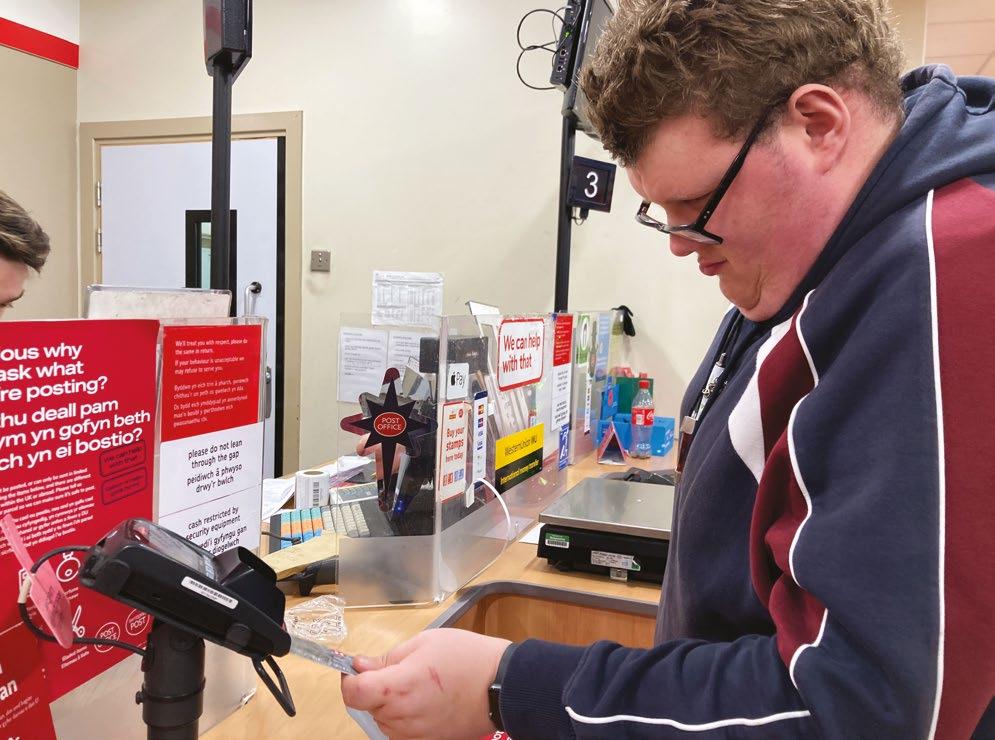
You may need to support your young person with money when they leave college.
If your young person only needs some support with benefits, then being an Appointee will be enough. If you are not already an Appointee you can find out more information about this at www.gov.uk/become-appointee-for-someoneclaiming-benefits
Your young person may be entitled to several benefits:
• Disability Living Allowance (DLA) or Personal Independence Payments (PIP)
• Employment and Support Allowance
• Attendance Allowance
• Universal Credit
• Housing Benefit
You can get support and information regarding benefits from Citizens Advice: www.citizensadvice.org.uk/benefits
If you are Continuing Health Care (CHC) funded, it is usually Social Services or your local health authority that will fund the next stage in a young person’s life after college. This will need to be agreed by the commissioners. If the EHCP is closed, education funding will stop.
Typically, social services will undertake a financial assessment to see if your young person has to contribute towards their support costs. If this is decided, this is usually a weekly payment that is invoiced monthly.

With National Star...
“Eddy really is a changed person. Shane DEYA Brewery “
Thanks to the support of National Star and the team at a craft brewery, Eddy has achieved his dream – a paid job.
It started with a month of voluntary work at DEYA Brewery in Cheltenham. He was supported by his job coach from National Star. He got on so well that DEYA offered him paid work. Two years on, Eddy continues to work in the warehouse picking and packing orders received through DEYA’s online shop.
‘When Eddy first arrived, he was quite shy, not very talkative and relied heavily on his job coach,’ said Shane Pargeter, Warehouse Manager at DEYA. ‘Now he works independently and can solely take care of his job. He’s a very funny and clever character with an amazing memory. He is well suited to the job he does.’
‘Once he started to do things on his own, we could sense a huge feeling of pride and achievement in himself. He really is a changed person,’ said Shane.
If your young person is going to live in Supported Living and they do not have the capacity to understand the tenancy agreement, then you will need to apply for Deputyship for Property and Financial Affairs.
A Deputy is someone appointed by the Court of Protection to make decisions on behalf of someone who lacks the capacity to make decisions for themselves.
If your young person can understand what the lasting power of attorney is, then they can appoint you to manage their financial affairs. You will need to fill out the forms on the Government website and register the LPA after paying a one–off fee.

Does my relative have capacity to make decisions about finances? (They need to be over 16 years; for under 16s you need to seek legal advice).
Do you only manage the person’s benefits including signing forms and deciding how to spend the money?
No, I have more financial responsibilities.
Take out insurance premium / security bond to protect the person’s finances.
Risk assessment carried out & supervision fee set (paid yearly). Complete and submit Annual report.
Application approved; notify all persons and organisations that you are a Deputy (GP, relatives, bank, utility companies etc).
You can appeal the decision (seek legal advice)
Application rejected.
Await notification from the Court of Protection.
You can employ a solicitor to help you apply to be a Deputy. Or you can make the application yourself via the Government website: www.gov.uk
There are fees associated with applying for a deputyship. There are possible financial exemptions depending on an applicant’s financial circumstances. You need to complete the exemption form if you think you qualify for an exemption.
You can request hard copies of all forms by calling: 0300 456 4600 or you can download the forms at www.gov.uk/courts-tribunals/court-of-protection
A booklet is available from the Court of Protection called “Making an application to the Court of Protection” (Reference: COP42) which provides all the information you need on making an application to be a Deputy. If you have any questions the Court of Protection has a helpline (0300 456 4600).

Apply for a Deputyship
Seek legal advice / Request application forms. Download at www.gov.uk or Tel: 0300 456 4600.
Is my relative likely to have diminished mental capacity in the future or need assistance with making decisions?
Send all 4 completed forms along with application fee or exemption form to the Court of Protection
Ensure support around financial decisions is included in your relative’s community care assessment plan.
Apply for a Lasting Power of Attorney
Receive forms asking you to notify other people involved and complete notification process.
You can apply to be a Deputy by using a solicitor to support you or you can make the application yourself via the government website: www.gov.uk. There are several costs involved in making an application for deputyship.
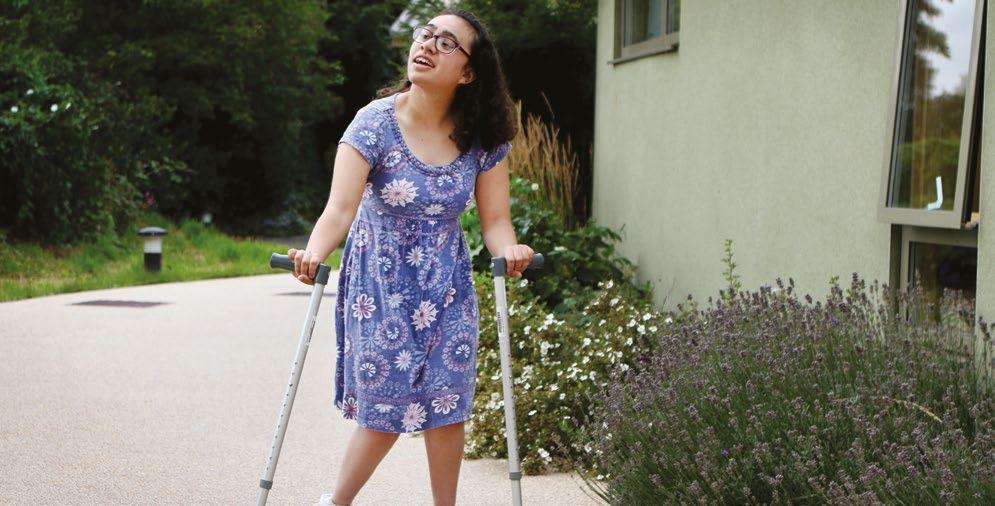
Most local authorities prefer people to live in their home county. They will expect you to explore the local offer for housing and services before looking at other options.
Most local authorities have a list of approved, preferred housing and service providers (found in the local authority’s Provider Framework). Sometimes you can choose a provider that is not on the list, but this needs to be agreed with social services.
If you wish your young person to live outside their home county, you will need to get this agreed by your local social services team before you begin to search for a provider in another area. Some National Star families have managed to secure this agreement in the past.
It is important to remember that your young person’s social worker may not discuss housing options until the latter part of a student’s final year.
But you do not have to wait until then to ask them for a list of preferred providers so that you can do your own research. Check provider websites and research their recent CQC inspection reports.
If your young person wishes to live alone, they can put their name down and bid for social housing provided by the local council. This option can be
supported by the local authority’s specialist housing team. Your social worker can support with the housing list application.
Most people move into residential or supported living, but it is possible for people with learning disabilities and autism to get a mortgage through a range of schemes such as shared ownership. For more information go to www.mysafehome.info.
One option for our students when they leave college is to move into supported living accommodation. As we all know it is crucial that you enjoy spending time with the people you live with.
We encourage all of our students to think about who they would like to live with post college from the day they arrive, some of our students meet their partner during their time at college, others find friends who become family and the National Star Team can help you explore the possibility of your young person sharing with another college leaver.
Whatever the outcome, we support each leaver’s choices and desired outcomes.
Learning does not need to stop when your young person leaves college. There are lots of opportunities for them to engage in community learning activities.
Some National Star students also go on to pursue full–time education at other settings, learning for pleasure or to gain skills that they may need to get a job or to live independently. Occupational activity brings health benefits such as improvements to mental and physical wellbeing and increased confidence, skills and self–esteem.
We know that keeping fit and active is good for everyone’s mental wellbeing too and we’d encourage all former students to explore what keeping fit means for them after college. Therapeutic support does not have to come to an end when someone leaves National Star. If your young person wishes to continue with private therapy support, we offer a private therapy service. Your local health authority may also be able to point you in the direction of a private therapist.
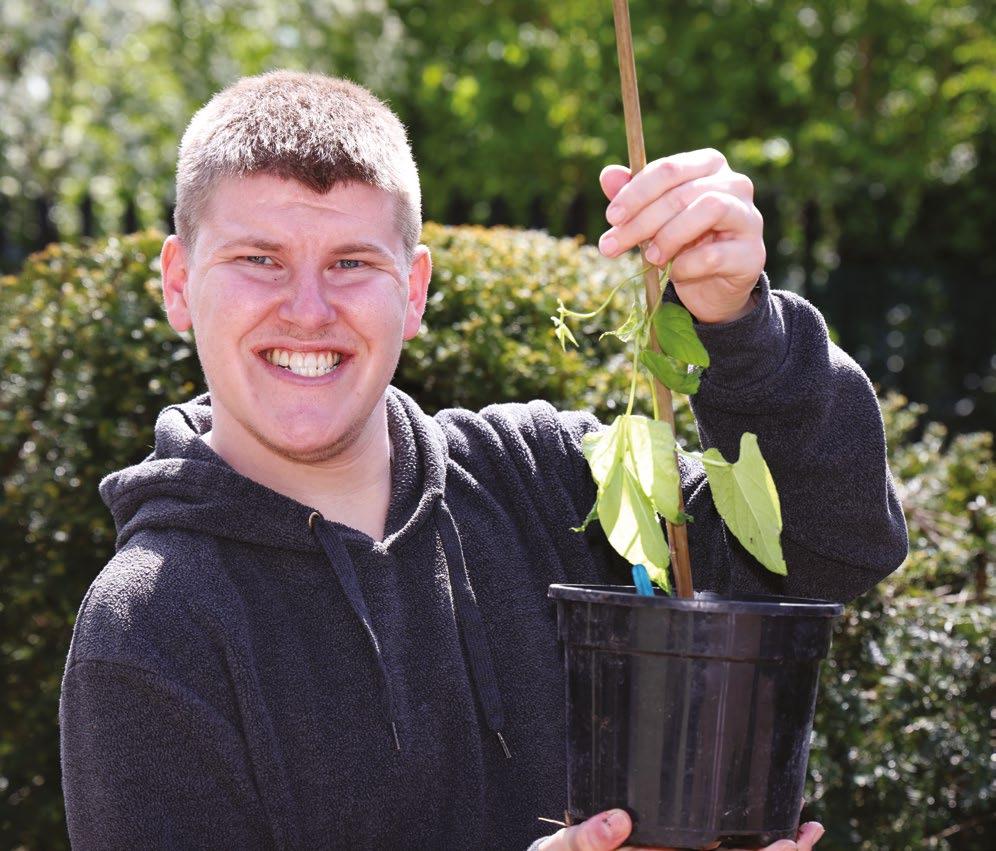
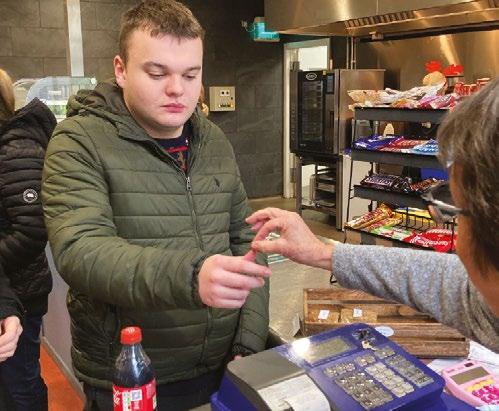
• Families / Carers to research local social clubs that can support future friendships / occupation.
• Students experience new interests through clubs and college activities.
• Transition Support team support the research of local social clubs.
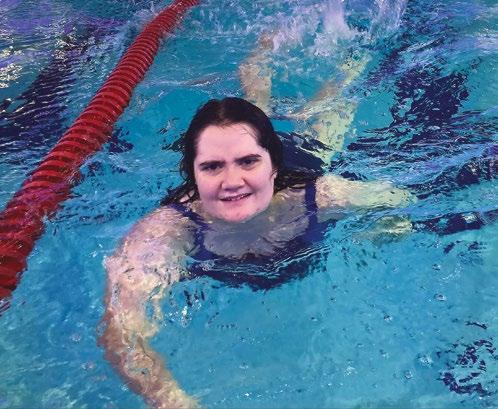
• Families / Carers liaise with local authority to understand their transition processes.
• Thoughts about long–term living aspirations discussed in ‘Planning For My Future’ sessions.
• Bespoke transition research provided by the Transition Support team where needed.
• Families / Carers to consider deputyship if required.
• Students start ‘Planning For My Future’ sessions to plan what they want after college.
• Introduction to student’s PLC or PLCT.
• Baseline review and current aspirations finalised.
• National Star Transition Event.
• Families / Carers, with social services support, identify local, summer activities.
• Students try new activities over the summer holidays
• First year reviews. PLC / PLCTs check that post–college goals remain the same.
• Families / Carers to visit potential long–term living providers on the local framework if possible.
• Students continue to explore interests for their future in ‘Planning for My Future’ sessions.
• National Star Transition Event.
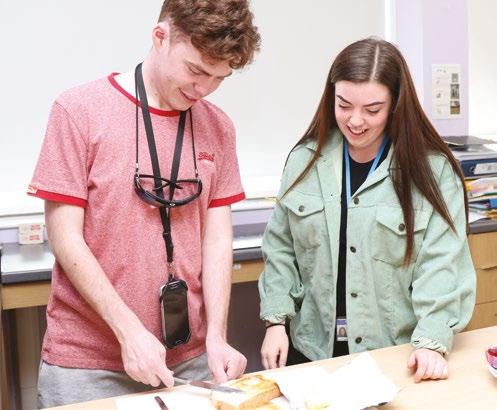
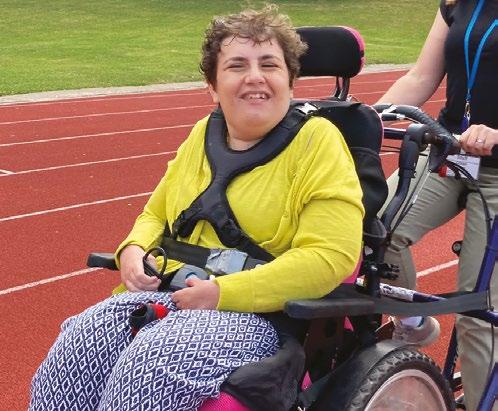
• Families / Carers to ensure their young person has been assigned a named social worker.
• Families / Carers to work with social worker / healthcare lead to explore local options.
• Students encouraged to confirm their long–term living plans in ‘Planning For My Future’ sessions. Young people will also explore interests and occupational activities available in their local areas.
• Students encouraged to engage with the Job Coach team to consider work and volunteering opportunities.
• PLC / PLCT can help organise familiarisation visits. They can also input into documentation for care need assessments.
• Before annual review PLC / PLCT will arrange transition meetings with families / carers and local authority.
• National Star Transition Event.
• Bespoke transition research can be provided by the Transition Support team
• Families / Carers to contact their local Social Services team.
• Students review ideas for the future in ‘Planning For My Future’ sessions.
• Annual Review confirms transition planning next steps.
• Families / Carers work with social worker to shortlist preferred providers.
• Families / Carers to visit potential new services.
• Families / Carers to ensure personal budget / care package is agreed with local authority.
• Students encouraged to engage with the Job Coach team to consider work and volunteering opportunities.
• Final Review.
• National Star will support assessments completed by providers.
• National Star supply supporting documents to new providers.
• Referrals made by National Star therapy teams to local authorities / social workers.
• Students encouraged to engage with the Job Coach team to consider work and volunteering opportunities.
• Families / Carers to revisit potential onward services.
• Future provider to work with National Star staff (shadowing and information sharing).
• Transition reports detailing all current support given to students prepared by National Star.
Please familiarise yourself with the following relevant legislation / helpful resources to support your young person with their life after college plans.
The Act specifies that young people should be at the centre of planning for their future and that young people with SEND are supported to prepare for adulthood.
The special educational needs and disability code of practice 0 – 25 years says this preparation means:
• Higher education or employment
• Independent living
• Participating in society; friendships and contributing to the local community
• Being as healthy as possible in later life
For more information on the SEND code of practice visit www.gov.uk/government/ publications/send-code-of-practice-0-to-25
The Care Act 2014 outlines a local authority’s duties in relation to assessing people’s needs and their eligibility for public funded care and support.
Under the Care Act 2014 local authorities must:
• Carry out an assessment of anyone who appears to need care and support irrespective of their likely eligibility for state funded care.
• Focus the assessment on the person’s needs and how they impact on their wellbeing and the outcomes they want to achieve.
• Involve the person in the assessment and, where appropriate, their carer or someone else they nominate.
• Provide independent advocacy if required.
• Consider other things besides care services that can contribute to the desired outcomes.
If you are unhappy with the assessment outcome and services provided you can make a complaint. Under the Care Act 2014 all local authorities must have a complaint procedure and give you clear information on how to make a complaint.
For more information visit: www.councilfordisabledchildren.org.uk/ resources/all-resources/filter/statutoryguidance/2014-care-act-easy-read
The Mental Capacity Act (MCA) 2005 and its amendment in 2019 apply to everyone involved in the care, treatment and support of people aged 16 and over living in England and Wales who are unable to make all or some decisions for themselves. The MCA protects and restores power to those vulnerable people who lack capacity.
The MCA also supports those who have capacity and choose to plan for their future. This is everyone in the general population who is over the age of 18.
All professionals must comply with the Code of Practice. It also provides support and guidance for less formal carers.
The MCA also ensures that a young person and their families are involved in the decision–making process, even if the young person lacks capacity. For more information visit: www.scie.org.uk/mca/introduction/mentalcapacity-act-2005-at-a-glance
Care Quality Commission—official website for CQC: www.cqc.org.uk
Care Inspectorate Wales—official website for CSSIW: www.careinspectorate.wales
Disability Rights, an information and advice resource for disability rights in education, employment and independent living. Offers free factsheets and helpline: www.disabilityrightsuk.org
Citizens Advice— for information and support regarding benefits: www.citizensadvice.org.uk/benefits
Government website—For information on becoming a deputy: www.gov.uk/become-deputy
National Network of Parent Carer Forums: www.nnpcf.org.uk
How to choose a support provider: www.vodg.org.uk/resource/new-resource-top-ten-tips-when-choosing-a-support-provider.html
Employing a personal assistant: www.equallives.org.uk/payroll-and-finance
Brokerage: A Local Authority (LA) Brokerage service will find service providers who can meet your needs and choices and arrange these services for you if you have a personal budget and have had your support plan agreed by your social worker (SW).
Tender System: This is the process of the local authority inviting offers (tenders) from outside housing providers to run specific services or contracts. The decision as to who is awarded the service or contract is normally made against pre–set criteria covering quality and value for money. Local authorities then only work with these specific housing providers
Panel: The role of the Housing Panel is to review applications for local authority funded placements, considering suitability for any service, ensuring the learner’s needs are met and care plans / hours / costs are acceptable. This will have already been assessed by the SW to enable a panel decision to be made regarding the best use of this accommodation, whilst giving consideration to the housing preference and views of the family / carers, the learner’s suitability for the service, whether their needs can be met by the provider and the current mix of other tenants / residents.
Local Offer: A local offer gives children and young people with SEND and their families the information to help them find the right help and support in their local area. If you Google search ‘Local Offer’ together with the county of your choice, you will find a link to the relevant pages.


